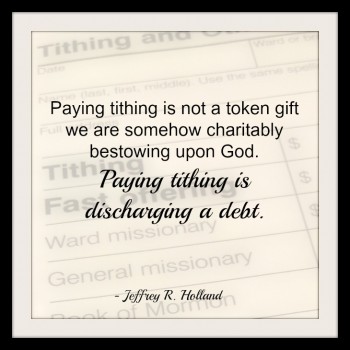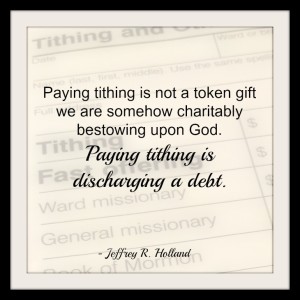Often articles attacking Mormons focus on their requirement of tithing. One writer said that most churches teach it but don’t require it and many writers assign a negative attitude toward being expected to pay tithing, even those who belong to other religions. This attitude fascinates me because it helps to outline one problem religious people today face—putting God before ourselves.
While many churches do not require the payment of tithing, God does. In Genesis 14, Abraham paid his tithing to Melchizedek. Malachi also taught tithing.
Will a man rob God? Yet ye have robbed me. But ye say, Wherein have we robbed thee? In tithes and offerings. Ye are cursed with a curse: for ye have robbed me, even this whole nation. Bring ye all the tithes into the storehouse, that there may be meat in mine house, and prove me now herewith, saith the Lord of hosts, if I will not open you the windows of heaven, and pour you out a blessing, that there shall not be room enough to receive it (Malachi 3:8-10).
This verse leaves no room for doubt: refusing to pay a full tithe is to rob God. Therefore, a church has a responsibility to require tithing of its members in order to make certain they are not helping them rob God.
What is a tithe?
The word means a tenth. Tithing, then is a tenth. Mormons teach that your tithe is a tenth of your increase, but do not define what that means. It is left to each person to decide this for himself through prayer, since the scriptures don’t define it any further. It is a voluntary payment, meaning that no one will show up at your home and force you to turn over the money. However, no commandment is consequence—free. From the day Adam and Eve were issued the first commandment, they were warned that their choices would have consequences.
A Mormon must pay a full and honest tithe in order to enter the temple. However, they are on the honor system—no tax forms or other documentation are requested. They are merely asked if they pay a full tithe. God reserves the temple, which is not used for regular weekly worship, for those willing to live the commandments. This is the earthly consequence of tithe paying. As with all commandments, of course, there will be other penalties issued at judgment for non-payment.
Are there blessings for paying tithing?
There are also rewards for paying your tithing. Malachi promised that the payment of tithes would result in so great there is no room to hold them all. Some have mistakenly interpreted that to mean they will become wealthy. However, the scripture does not mention money. It mentions only blessings, and God has many ways to bless us that have nothing to do with money. Gordon B. Hinckley, a former Mormon prophet, warned:
Now, do not get me wrong. I am not here to say that if you pay an honest tithing you will realize your dream of a fine house, a Rolls Royce, and a condominium in Hawaii. The Lord will open the windows of heaven according to our need, and not according to our greed. If we are paying tithing to get rich, we are doing it for the wrong reason. The basic purpose for tithing is to provide the Church with the means needed to carry on His work. The blessing to the giver is an ancillary return, and that blessing may not be always in the form of financial or material benefit. In speaking of opening the windows of heaven, Malachi continues by saying:
And I will rebuke the devourer for your sakes, and he shall not destroy the fruits of your ground; neither shall your vine cast her fruit before the time in the field. …
And all nations shall call you blessed: for ye shall be a delightsome land, saith the Lord of hosts. (Mal. 3:11–12.)
Tithing is used to carry out God’s work. Although Mormons do not receive salaries for their church positions, costs are incurred for buildings, teachings supplies, missionary work, and other church requirements. In addition, the Mormons, like most churches, carry out humanitarian work and this too costs money. There are strict rules about how tithing can be used and needs outside those rules are paid for from the Church’s for-profit businesses. Unlike most churches, the Mormons do not wrap their businesses into their ministry and maintain a small number of businesses which do not bring in enough funds to sustain the church for any significant length of time. However, they do allow funds to be paid out for things that cannot be covered by tithing. For instance, Mormon apostles and prophets, unlike other volunteers, must serve fulltime until death. While most have other sources of income, such as pensions, those who do not can receive a modest stipend to sustain them. These cannot be paid for out of tithing, so they come for businesses are that taxed.
It should be noted that Mormons believe tithing is a gift to them from God. It allows them to minimize the importance of money in their lives. While money is necessary to live, it should not be so important that we can’t give some of it back to God. Mormons remember that God gave them everything they have and to return just ten percent of it to Him for His work is a small price to pay for the blessings they have received. Many Mormons have experienced God’s concern for both their temporal and their spiritual needs and feel they cannot afford to not tithe—they want those blessings Malachi promised. However, the most important reason Mormons tithe, and all others should as well, is to demonstrate that we recognize the source of everything we have and are happy to share it with God and with others.


